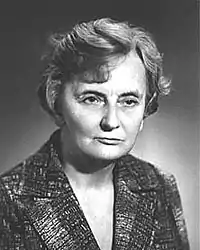Aushra Augustinavichute
Aushra Augustinavichute (en lituanien Aušra Augustinavičiūtė), née le et décédée le , sociologue et psychologue lituanienne, est l'inventeur de la socionique, théorie des types de personnalité inspirée des idées de Carl Gustav Jung[1], et associant sociologie et psychologie.

| Naissance |
Kaunas |
|---|---|
| Décès |
Vilnius |
| Nationalité |
|
| Formation | Université de Vilnius |
|---|---|
| Titres | Docteur en sciences économiques |
| Profession | Psychologue, économiste et sociologue |
| Employeur | Université lituanienne de sciences pédagogiques (en) |
| Travaux | socionique |
| Approche | Psycho sociologique |
Parcours
Elle soutient sa thèse de doctorat en sciences économiques de l'université de Vilnius en 1956.
Elle travailla au ministère des Finances de Lituanie, et également par la suite en tant que professeur de sciences économiques et politiques dans différents établissements éducatifs de la ville de Vilnius.
Bien que ses travaux aient été connus de quelques spécialistes à l'époque de la Guerre Froide, ses travaux scientifiques n'étaient pas édités, car non conformes à la doctrine "scientifique" soviétique officielle.
En 1968, elle devint la doyenne de la faculté des études familiales de l'Institut pédagogique de Vilnius.
A partir des années 1990, après l'effondrement de l'URSS, purent enfin être diffusés l'ensemble de ses travaux à la communauté scientifique internationale, qui découvrit alors la socionique[2], théorie originale que l'on peut considérer comme le pendant "soviétique" du Myers Briggs Type Indicator.
Notes et références
- Blutner R., Hochnadel E., « Two qubits for CG Jung's theory of personality », Cognitive Systems Research, vol. 11, no 3, , p. 243-259 (lire en ligne)
« Socionics was developed in the 1970s and 1980s mainly by the Lithuanian researcher Ausra Augustinaviciute. The name 'socionics' is derived from the word 'society, since Augustinaviciute believed that each personality type has a distinct purpose in society, which can be described and explained by socionics. The system of socionics is in several respects similar to the MBTI; however, whereas the latter is dominantly used in the USA and Western Europe, the former is mainly used in Russia and Eastern Europe. For more information, the reader is referred to the website of the International Institute of Socionics and to several scientific journals edited by this institution (see http://socionic.info/en/esocjur.html#top). Despite of several similarities there are also important differences. For instance, the MBTI is based on questionnaires with so-called forced-choice questions. Forcedchoice means that the individual has to choose only one of two possible answers to each question. Obviously, such tests are self-referential. That means they are based on judgments of persons about themselves. Socionics rejects the use of such questionnaires and is based on interviews and direct observation of certain aspects of human behavior instead. However, if personality tests are well constructed and their questions are answered properly, we expect results that often make sense. For that reason, we do not reject test questions principally, but we have to take into account their self-referential character. Another difference relates to the fact that socionics tries to understand Jung's intuitive system and to provide a deeper explanation for it, mainly in terms of informational metabolism (Kepinski & PZWL, 1972). Further, socionics is not so much a theory of personalities per se, but much more a theory of type relations providing an analysis of the relationships that arise as a consequence of the interaction of people with different personalities. »
- Fink G. and Mayrhofer W. Cross-cultural competence and management — setting the stage // European J. Cross-Cultural Competence and Management. — 2009. — Vol. 1. — No. 1.
« Personality profiling encompasses numerous models that arise from personality trait theory. In the context of this article, four models deserve special attention due to their importance in personality research and/or their appropriateness for the topic: Socionics (founded in the 1970s by Ausra Augustinavichiute, e.g., Augustinavichiute, 1994, 1998); cybernetic mindscape theory (Maruyama, 1980; Boje, 2004); the five factor model (FFM), commonly called the ‘big five’ personality trait model (Costa and McCrae, 1992); the personality type theory of the Myers-Briggs type inventory (MBTI, see McKenna et al., 2002) »